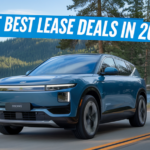With BYD, NIO, and XPeng expanding globally, Chinese EV brands are becoming a serious challenge to Tesla's dominance.
The Changing Landscape of the EV Market
The electric vehicle (EV) market has undergone a seismic shift in recent years, with Chinese EV manufacturers rapidly expanding their global presence. Once dominated by Tesla, the industry is now witnessing a surge in competition, particularly from brands like BYD, NIO, XPeng, and Geely. These companies are producing high-tech, affordable, and long-range EVs, raising the question:
Are Chinese EV brands a real threat to Tesla?
Tesla, once the undisputed leader in EV innovation and sales, is now facing increasing competition in key markets like the U.S., Europe, and China. While Tesla continues to be a powerhouse in the industry, Chinese automakers are introducing cutting-edge technology, aggressive pricing, and strong domestic support, posing a significant challenge to the American EV giant.
In this analysis, we’ll explore the rise of Chinese EV brands, their competitive advantages, and whether they truly have the potential to disrupt Tesla’s dominance in the global market.
The Rise of Chinese EV Manufacturers
1. BYD: The Global EV Powerhouse
BYD (Build Your Dreams) has quickly become Tesla’s biggest competitor and is now the world’s largest EV manufacturer by volume. Backed by Warren Buffett’s Berkshire Hathaway, BYD has aggressively expanded beyond China, with significant sales growth in Europe, Latin America, and Asia.
Why Is BYD a Threat to Tesla?
✔ Cheaper Battery Technology: BYD’s blade battery technology is safer, longer-lasting, and more affordable than Tesla’s lithium-ion batteries.
✔ Mass Production Power: BYD produces its own batteries, reducing reliance on third-party suppliers and lowering production costs.
✔ Strong Domestic Market Share: While Tesla remains popular in China, BYD outsells it significantly in the region, offering a wider variety of models at lower price points.
2. NIO: The Premium EV Challenger
Often referred to as the “Tesla of China,” NIO is gaining traction with its high-performance, luxury EVs and unique business model.
How NIO Is Competing with Tesla:
✔ Battery-Swapping Technology: Instead of waiting for a battery to charge, NIO owners can swap out their battery in under 5 minutes at dedicated battery-swap stations.
✔ Premium Experience: NIO is positioning itself as a luxury brand, much like Tesla, but with unique customer service perks like exclusive lounges and lifetime free charging.
✔ Expansion into Europe: NIO has already launched in Norway, Germany, and other European markets, targeting Tesla’s customer base.
3. XPeng: The Tech-Focused Disruptor
XPeng is another rising Chinese EV brand that is competing directly with Tesla on software, autonomy, and smart technology.
XPeng’s Key Competitive Advantages:
✔ Advanced Autonomous Driving: XPeng’s XNGP self-driving system is considered one of the most advanced in the industry, rivaling Tesla’s Full Self-Driving (FSD).
✔ Aggressive Pricing: XPeng offers EVs with high-tech features at a much lower price than Tesla.
✔ Global Expansion: XPeng is entering European markets, with plans for U.S. expansion in the near future.
4. Geely and Other Emerging Players
Chinese automaker Geely, which owns brands like Volvo and Polestar, is leveraging its global footprint to push EVs worldwide. Other companies like Li Auto, Zeekr, and MG Motors (now owned by China’s SAIC) are also ramping up EV production and exports.
Why Are Chinese EV Brands So Competitive?
1. Cost Advantage & Government Support
Chinese EV manufacturers benefit from lower production costs, thanks to:
🔹 Government subsidies and tax incentives for domestic EV production
🔹 Cheaper labor and manufacturing costs
🔹 Strong battery supply chain, as China dominates the global EV battery market
2. Faster Innovation & Technology Adoption
Chinese EV makers invest heavily in R&D, often outpacing Tesla in areas like battery technology, AI, and smart connectivity. NIO, XPeng, and BYD are leading the charge with:
✔ More affordable long-range batteries
✔ Advanced self-driving tech
✔ In-car AI assistants and entertainment systems
3. Diverse Model Lineups
Unlike Tesla’s limited number of models, Chinese brands offer a wider variety of EVs, from budget-friendly city cars to luxury sedans and SUVs. This allows them to capture a larger audience.
Can Tesla Stay Ahead?
While Chinese EV brands are rapidly expanding, Tesla still holds key advantages:
1. Strong Brand Loyalty & Reputation
Tesla has built a powerful brand, with a reputation for innovation, performance, and cutting-edge technology. Many consumers still see Tesla as the gold standard in EVs.
2. Supercharger Network
Tesla’s Supercharger network remains one of the largest and most reliable charging infrastructures worldwide, giving it an edge over competitors.
3. Full Self-Driving (FSD) & AI Leadership
Tesla’s FSD technology continues to improve, and with advancements in AI, it may remain the leader in autonomous driving for years to come.
4. Expanding Production Capacity
Tesla is building new gigafactories worldwide, including in Germany, Texas, and possibly India, to counter the production scale of Chinese manufacturers.
The Future: Will Chinese EV Brands Overtake Tesla?
The EV market is shifting rapidly, and while Tesla remains a dominant force, Chinese EV brands are closing the gap fast. BYD, NIO, XPeng, and others are offering affordable, high-tech alternatives that appeal to both budget-conscious and luxury EV buyers.
Scenarios for the Future:
✔ If Tesla innovates rapidly, it can maintain dominance through FSD, AI, and battery advancements.
✔ If Chinese EV brands expand aggressively, they could outsell Tesla globally by offering cheaper, feature-rich EVs.
✔ If global regulations favor local manufacturing, Tesla may face import restrictions in key markets, while Chinese brands may benefit from government-backed expansion.
Is Tesla’s Reign at Risk?
While Tesla still leads the EV market, the rise of Chinese EV manufacturers poses a serious challenge. With lower prices, innovative technology, and strong government backing, brands like BYD, NIO, and XPeng are already taking market share from Tesla in key regions.
What to Watch in 2025 and Beyond:
🔹 Can Tesla lower prices to compete with Chinese brands?
🔹 Will Chinese EVs gain traction in the U.S. market?
🔹 How will Tesla respond to advanced battery & AI tech from China?
The EV race is far from over, but one thing is certain: Tesla is no longer alone at the top.


